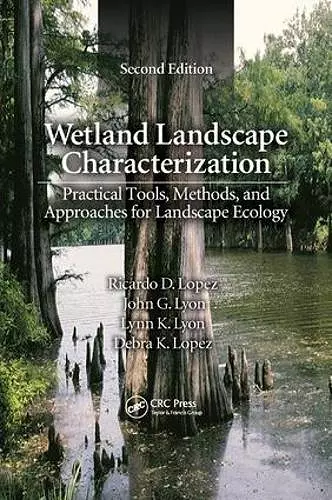Wetland Landscape Characterization
Practical Tools, Methods, and Approaches for Landscape Ecology, Second Edition
Ricardo D Lopez author John G Lyon author Lynn K Lyon author Debra K Lopez author
Format:Paperback
Publisher:Taylor & Francis Ltd
Published:30th Nov '17
Currently unavailable, and unfortunately no date known when it will be back
This paperback is available in another edition too:
- Hardback£205.00(9781466503762)

Wetlands are, by their very nature, ephemeral and transitional, which makes them challenging to characterize. Yet the need for characterizing wetlands continues to grow, particularly as we develop a better understanding of the wealth of ecosystem services that they provide. This book provides practical tools and methods to help practitioners more effectively locate, identify, and map the extent of wetlands, and therefore better understand the importance of wetlands to society and the larger landscape. The authors address jurisdictional, regulatory, and practical applications from the scientific, engineering, and lay perspectives. Numerous techniques, examples, figures, and lessons learned supply the ideas and solutions needed for solving the complex issues associated with wetlands. This second edition has been updated throughout and includes more techniques, examples, and illustrations.
"The main strengths of the book include its practical geospatial approaches and rich case study examples… . This is an excellent reference book, one of a kind, for a variety of wetland landscape characterization issues."
—Professor Wei "Wayne" Ji, University of Missouri–Kansas City, USA
"Wetland Landscape Characterization will clearly be an invaluable resource for scientists and professionals involved in wetlands assessment and monitoring. The authors provide an in-depth understanding of traditional-to-contemporary methods of characterizing wetlands, the methods used to integrate field-based and geospatial data, the keys to analysis at multiple scales, and determining the ecological function of wetlands. These topics are brought to life through a wide range of case studies that provide the reader with an invaluable learning tool and significant new insight. Wetland Landscape Characterization is an essential reference for all those involved in wetland ecology."
—Stuart E. Marsh, University of Arizona, Tucson, USA
"… provides good technical explanations of concepts such as an ‘ecological indicator’ or ‘landscape metrics’, which allows the non-specialist reader to understand the methodology used in assessment of wetland health and habitat risk. I also appreciated the discussion linking ecosystem services to the health of the White River aquatic ecosystems, which drives home the importance of proper wetland management. The concept of the Unified Vulnerability Index (UVI) is presented clearly, providing a novel, yet comprehensive indicator to ascertain in a holistic manner. It is a strength of the material that the pros and cons of the UVI are mentioned in some detail."
—Douglas Cripe, Scientific Officer, Group on Earth Observations (GEO) Secretariat, Geneva, Switzerland
"The book explains how to locate, identify, and map the extent of wetlands to learn more about their importance to society and the larger landscape. It examines jurisdictional, regulatory, and practical applications from the scientific, engineering, and lay perspectives. Fully updated, the second edition reflects an emerging infrastructural, ecosystem goods-and-services perspective to better assist readers who may encounter these concepts and challenges as they assess and characterizewetlands."
––Northeastern Naturalist, Volume 20, 2013
"The main strengths of the book include its practical geospatial approaches and rich case study examples… . This is an excellent reference book, one of a kind, for a variety of wetland landscape characterization issues."
—Professor Wei "Wayne" Ji, University of Missouri–Kansas City, USA
"Wetland Landscape Characterization will clearly be an invaluable resource for scientists and professionals involved in wetlands assessment and monitoring. The authors provide an in-depth understanding of traditional-to-contemporary methods of characterizing wetlands, the methods used to integrate field-based and geospatial data, the keys to analysis at multiple scales, and determining the ecological function of wetlands. These topics are brought to life through a wide range of case studies that provide the reader with an invaluable learning tool and significant new insight. Wetland Landscape Characterization is an essential reference for all those involved in wetland ecology."
—Stuart E. Marsh, University of Arizona, Tucson, USA
"… provides good technical explanations of concepts such as an ‘ecological indicator’ or ‘landscape metrics’, which allows the non-specialist reader to understand the methodology used in assessment of wetland health and habitat risk. I also appreciated the discussion linking ecosystem services to the health of the White River aquatic ecosystems, which drives home the importance of proper wetland management. The concept of the Unified Vulnerability Index (UVI) is presented clearly, providing a novel, yet comprehensive indicator to ascertain in a holistic manner. It is a strength of the material that the pros and cons of the UVI are mentioned in some detail."
—Douglas Cripe, Scientific Officer, Group on Earth Observations (GEO) Secretariat, Geneva, Switzerland
"The book explains how to locate, identify, and map the extent of wetlands to learn more about their importance to society and the larger landscape. It examines jurisdictional, regulatory, and practical applications from the scientific, engineering, and lay perspectives. Fully updated, the second edition reflects an emerging infrastructural, ecosystem goods-and-services perspective to better assist readers who may encounter these concepts and challenges as they assess and characterizewetlands."
––Northeastern Naturalist, Volume 20, 2013
ISBN: 9781138076099
Dimensions: unknown
Weight: 544g
324 pages
2nd edition